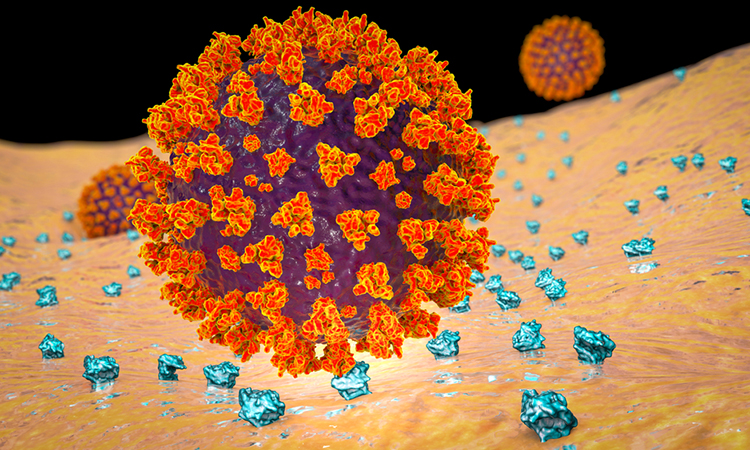Exploring the connection between COVID-19 and diabetes
Posted: 16 April 2021 | Victoria Rees (Drug Target Review) | No comments yet
Dr Brittany Busse discusses why COVID-19 can influence the onset of diabetes and how this could shape the development of therapeutics.


With connections being made between diabetes and COVID-19, it is becoming increasingly important to discover how exactly the two conditions are related. Some research has indicated that COVID-19 can cause severe complications for patients with pre-existing diabetes, while some scientists have suggested that the coronavirus could even trigger then onset of diabetes in healthy individuals.
Drug Target Review’s Victoria Rees conducted a Q&A with Dr Brittany Busse, Associate Medical Director at WorkCare, to discover why COVID-19 can influence the onset and progression of diabetes and how this can inform the development of treatments.
Can you explain how COVID-19 influences the onset of diabetes?
Severe Acute Respiratory Syndrome coronavirus 2 (SARS-CoV-2), the virus that causes the inflammatory syndrome COVID-19, inserts itself into cells by binding to the cellular receptor angiotensin converting enzyme-2 (ACE2). This receptor is expressed on multiple organs and tissues including blood vessels, respiratory cells, small intestinal cells and pancreatic beta cells – which are the cells responsible for insulin production. Other coronaviruses have been shown to induce ketosis-prone diabetes by binding the ACE2 receptors of the pancreatic beta cells and causing inflammation within the cells that damage the cells. It has been shown that damage to more than 90 percent of the cells will result in non-autoimmune diabetes. Another proposed mechanism is that when the virus infiltrates the cell it relates islet cell antigens and the host inflammatory response mediated by T cells against these antigens may result in autoimmunity and damage to pancreatic beta cells.
How can we identify who is most at risk?
The best way to prevent severe disease, inflammatory complications like new-onset diabetes and death from COVID-19 is for everyone to be vaccinated”
People at risk would include those who are genetically susceptible to type 1 diabetes or insulin dependent diabetes and those who may already have some low level of pancreatic inflammation or pre-diabetes. Those with pre-existing non-insulin dependent diabetes may be at risk for becoming insulin dependent after infection with SARS-CoV-2 due to stress hyperglycaemia-induced damage to pancreatic beta cells, although studies are showing that many hospitalised patients with COVID-19 and new onset hyperglycaemia have no risk factors, including pre-existing diabetes, pre-diabetes or obesity. People who are hospitalised with severe respiratory disease are at the highest risk, even if they do not receive corticosteroids. Hospitalised patients with hyperglycaemia are at higher risk for death and complications from COVID-19 pneumonia than those without hyperglycaemia. In previous studies of people infected with SARS-CoV-1 who developed new onset insulin dependent diabetes, however, insulin-dependent diabetes mellitus (IDDM) has not persisted in a majority of the individuals, with only two still having the disease at a follow up after three years. Children and adults have both presented with new onset of IDDM after infection with SARS-CoV-2.
How might this influence the research of potential treatments?
As the effect seems to be immune modulated, further research may be done on whether or not immune regulating medications have any effect on the outcome. Treatments that have been suggested include hydroxychloroquine, anti-cytokine therapy with monoclonal antibodies (mAbs) and passive immunity by infusion of IgG positive plasma from recovered patients.
Are there any drugs that can be repurposed to tackle COVID-19 and diabetes?
The best way to prevent severe disease, inflammatory complications like new-onset diabetes and death from COVID-19 is for everyone to be vaccinated. All vaccines have been shown in clinical trials to be 100 percent effective at preventing death and severe disease from infection with SARS-CoV-2. This has been shown to be true even in trials conducted in South Africa and Latin America where they have a high incidence of emerging variants. That being said, there is some speculation that immunomodulating drugs like hydroxychloroquine may help protect patients from severe inflammatory syndrome and prevent severe acute respiratory disease as well as injury to pancreatic cells, but there is no evidence that this medication would be of benefit at this time.
Related topics
Disease research, Drug Development, Drug repurposing, Molecular Targets, Proteomics
Related conditions
Covid-19, Diabetes, type 1 diabetes
Related organisations
WorkCare
Related people
Dr Brittany Busse


